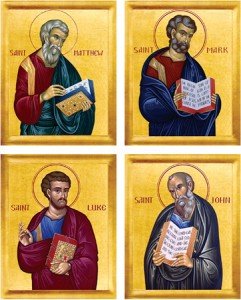 Some might wonder why I’m sharing this rather technical information about New Testament (NT) criticism. I’m doing this because I believe it is critical to understand something about NT studies in a world which wants to reduce the NT to very fundamental ideas. In many modern Christian Churches, there seems to be an effort to make the NT a simple historical document that has a very simple message. This, I believe, is not true. I have found that when the NT is reduced to fundamental ideas, it is usually because it can then become a political tool to manipulate people. People tend to like things black and white and don’t want to have to think about things. The truth of the matter is that most things even in the NT are “grey”. I find that people that have a very fundamental approach to the NT, want to believe that they can really know God and, therefore, put Him in a little box that they have made. What they end up doing is making God in their image and likeness rather than attempting to grow in HIS IMAGE and LIKENESS.
Some might wonder why I’m sharing this rather technical information about New Testament (NT) criticism. I’m doing this because I believe it is critical to understand something about NT studies in a world which wants to reduce the NT to very fundamental ideas. In many modern Christian Churches, there seems to be an effort to make the NT a simple historical document that has a very simple message. This, I believe, is not true. I have found that when the NT is reduced to fundamental ideas, it is usually because it can then become a political tool to manipulate people. People tend to like things black and white and don’t want to have to think about things. The truth of the matter is that most things even in the NT are “grey”. I find that people that have a very fundamental approach to the NT, want to believe that they can really know God and, therefore, put Him in a little box that they have made. What they end up doing is making God in their image and likeness rather than attempting to grow in HIS IMAGE and LIKENESS.
I have one basic strategy to assess NT ideas that some people promote: if they lead to “judging” and “hating” others, then they cannot be of God.
In the nineteenth century biblical criticism, building on the work of previous scholars, pursued two very different directions: critically, scholars were concerned with the question of the historical value of the NT and also, theologically, concerned with the underlying meaning of the NT. These two directions shaped the subsequent history of NT criticism (Biblical criticism means the work that scholars do to come to a deeper and clearer understanding of the NT and other sacred scriptures. This means analyzing the meaning of words in the original language, taking into consideration the culture in which they were written, and seeing how the words were used in other written texts.
Few schools have been as influential in this work as that of the University of Tubingen, Germany. Truly the questions formulated by this school and the fundamental insights it has provided have been determinative for all later NT criticism. (Pope Benedict XVI taught dogmatic theology at this university).
It is also my hope that in sharing this information with my readers they may become truly “intelligent” and “thoughtful” Christians and find God’s revelation in the NT to be helpful to them as they journey on the path of life and face all the exigencies of life. God would not have given us a mind if all answers where simple!
